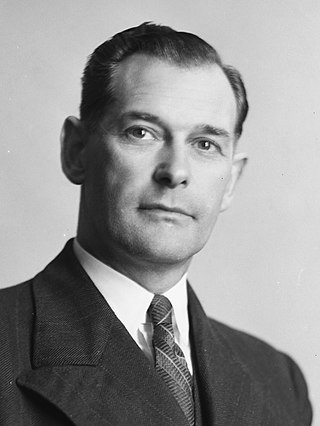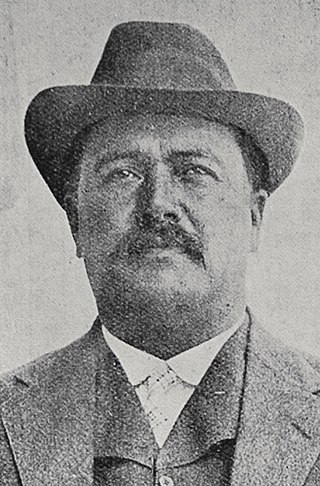
Rātana is a Māori Christian church and movement, headquartered at Rātana Pā near Whanganui, New Zealand. The Rātana movement began in 1918, when Tahupōtiki Wiremu Ratana experienced visions, and began a mission of faith healing. In 1925 the Ratana Church was formed, and on 25 January 1928—T. W.'s 55th birthday, and "Rātana Day"—the church's iconic temple, Te Temepara Tapu o Ihoa was opened. From its beginning and through to the 20th century, the church has pursued political goals, and still welcomes political leaders to the Rātana Pā annually on Ratana's birthday. In the 2018 New Zealand census, 43,821 people identified with the religion.

The 39th New Zealand Parliament was a term of the Parliament of New Zealand which began with the general election held on 25 November 1978, and finished with the general election held on 28 November 1981. The dates of the Muldoon Ministry were from 13 December 1978 to 11 December 1981.

The 1938 New Zealand general election was a nationwide vote to determine the shape of the New Zealand Parliament's 26th term. It resulted in the governing Labour Party being re-elected in a landslide, winning nearly 56% of the vote despite not gaining any more seats. Having replaced the United-Reform coalition, the newly founded National Party also gained a certain amount of ground.

The 1943 New Zealand general election was a nationwide vote to determine the shape of the New Zealand Parliament's 27th term. With the onset of World War II, elections were initially postponed, but it was eventually decided to hold a general election in September 1943, around two years after it would normally have occurred. The election saw the governing Labour Party re-elected by a comfortable margin, although the party nevertheless lost considerable ground to the expanding National Party.

The 1949 New Zealand general election was a nationwide vote to determine the shape of the New Zealand Parliament's 29th term. It saw the governing Labour Party defeated by the opposition National Party. This marked the end of the 14-year First Labour government and the beginning of the First National government.

The 1963 New Zealand general election was a nationwide vote to determine the shape of New Zealand Parliament's 34th term. The results were almost identical to those of the previous election, and the governing National Party remained in office.

Mana Māori Motuhake was a Māori political party in New Zealand from 1980 to 2005. The name is difficult to translate accurately, but essentially refers to Māori self-rule and self-determination — mana, in this context, can be understood as "authority" or "power", while motuhake can be understood as "independent" or "separate". The purpose of the party was to unify Māori to gain 'political potency'. From 1991 to 2002, the party participated in the left-wing Alliance.

Taurekareka "Tau" Hēnare was a Māori member of the New Zealand Parliament from 1914 to 1938, sitting for the Reform Party for most of that time, until it merged with the United Party to form the National Party in 1936.
The Northern Maori by-election of 1980 was a by-election for the Northern Maori electorate during the 39th New Zealand Parliament. It was prompted on 29 April by the resignation of Matiu Rata, a former member of the Labour Party who was establishing a new group, Mana Motuhake. Rata believed that contesting a by-election would give him a mandate for his change of allegiance. In the end, however, his plan backfired when the seat was won by Bruce Gregory, his replacement as the Labour Party candidate.

Matiu Waitai Rata was a Māori politician who was a member of the New Zealand Parliament for the Labour Party from 1963 to 1980, and a cabinet minister from 1972 to 1975. In 1979 he resigned from the Labour Party and formed the Mana Motuhake Party.

Tāpihana Paraire "Dobbie" Paikea, also known as Dobson, was a New Zealand politician and Rātana morehu who won the Northern Maori electorate for Labour in 1943. He was a Māori of Te Roroa, Te Parawhau and Ngāti Whātua descent. He was elected following the death of his father Paraire Karaka Paikea who had been the MP, and he held the parliamentary seat until his own death in 1963.

Iriaka Matiu Rātana was a New Zealand politician and Rātana morehu who won the Western Maori electorate for Labour in 1949. She succeeded her husband Matiu Rātana to become the first woman to represent Māori in the New Zealand Parliament. She held the electorate until her retirement in 1969.

Te Tai Tokerau is a New Zealand parliamentary Māori electorate that was created out of the Northern Maori electorate ahead of the first Mixed Member Proportional (MMP) election in 1996. It was held first by Tau Henare representing New Zealand First for one term, and then Dover Samuels of the Labour Party for two terms. From 2005 to 2014, it was held by MP Hone Harawira. Initially a member of the Māori Party, Harawira resigned from both the party and then Parliament, causing the 2011 by-election. He was returned under the Mana Party banner in July 2011 and confirmed at the November 2011 general election. In the 2014 election, he was beaten by Labour's Kelvin Davis, ending the representation of the Mana Party in Parliament.
Bruce Craig Gregory was a New Zealand politician of the Labour Party.
Western Maori was one of New Zealand's four original parliamentary Māori electorates established in 1868, along with Northern Maori, Eastern Maori and Southern Maori. In 1996, with the introduction of MMP, the Maori electorates were updated, and Western Maori was replaced with the Te Tai Hauāuru and Te Puku O Te Whenua electorates.
Northern Maori was one of New Zealand's four original parliamentary Māori electorates established in 1868, along with Eastern Maori, Western Maori and Southern Maori. In 1996, with the introduction of MMP, the Maori electorates were updated, and Northern Maori was replaced with the Te Tai Tokerau electorate.
Nau Pāraone Kawiti Pūriri was a New Zealand land title officer and Māori welfare worker. Of Māori descent, he identified with the Ngāpuhi, Ngāti Hine and Ngāti Kahu o Torongare iwi. He was born in Ngararatunua, Northland, New Zealand in 1924.
The Grey Lynn by-election 1963 was a by-election held in the Grey Lynn electorate in Auckland during the term of the 33rd New Zealand Parliament, on 18 May 1963.
The Otahuhu by-election 1963 was a by-election held in the Otahuhu electorate in Auckland during the term of the 33rd New Zealand Parliament, on 16 March 1963.













